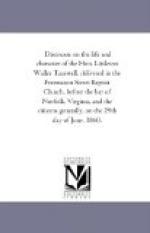complete soldiers of our citizen corps. Leaning
to the federal side in politics, he, like the gallant
Taylor, knew no party when the sword was to be drawn.
At the early age of twenty-five he was made Colonel
of the Ninth Regiment, was in active service during
the Douglas war, as the affair that grew out of the
affair with the Chesapeake was called, and, during
the late war with Great Britain, commanded in the
field the Second and Ninth Regiments, establishing
an exactness of discipline and an
esprit du corps
which was a favorite topic of remark in the army.
He was the soul of honor. His name was an authority,
his word was a witness, wherever the one was known
or the other uttered; and there were those who predicted
for him, whether he should engage in the field or
at the bar, a brilliant fame. Between him and
Tazewell, who were nearly of the same age, the most
affectionate friendship existed—a friendship
which, founded on mutual esteem, and cemented by mutual
kindness, has descended already to the third generation.
In 1823, at the age of forty-seven, this excellent
man passed away. I only knew him in his latter
years and in my boyish days. I see him as, when
our waters were filled with hostile fleets, he marched
at the head of his regiment, on a horse richly caparisoned,
shining with silver and steel. I see him as he
walked along the street, a tall slim man, quick in
his movements, and inspiring, by his air and gait
and benignant eye, respect and even affection.
He was early bald on the upper part of his head; but,
by way of atonement, wore to the last, sometime after
it was dropped by others, a long queue, that attracted
the passing glance of the boys. He was, I think,
except Seth Foster and Moses Myers, the last of the
queues. He came of an old Anglo-Saxon stock.
His name for centuries in Scotland and in England had
been borne by archbishops and illustrious laymen;
and in our own times, in the earlier part of this
century, it was the synonym of British philanthropy.
But neither early nor late, in the Old World or in
the New, was it ever borne by a nobler or a purer
man—a man over whose grave more gentle
and more precious memories should hover—than
WILLIAM SHARP.
When, in 1802, Tazewell appeared at the Norfolk bar,
party politics were in a state of active fermentation.
The passions of men became involved in the contests
of the day to an extent which has not been reached
since, and entered into the private relations of life.
Men of business who had important cases for trial,
and who were, for the most part, attached to the federal
party, called in the aid of the federal members of
the bar; but it was soon seen that the young republican
lawyer, who had voted for the resolutions of ’98-’99,
and for the report of ’99-1800, and who had
helped by his vote in the House of Representatives
to elect Mr. Jefferson president, had introduced a
new practice into the courts, and began to win verdicts
in the greatest cases from all his federal opponents.




